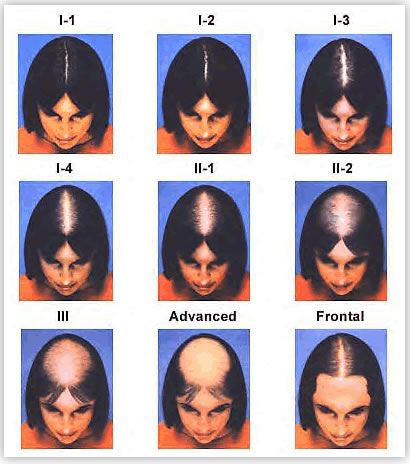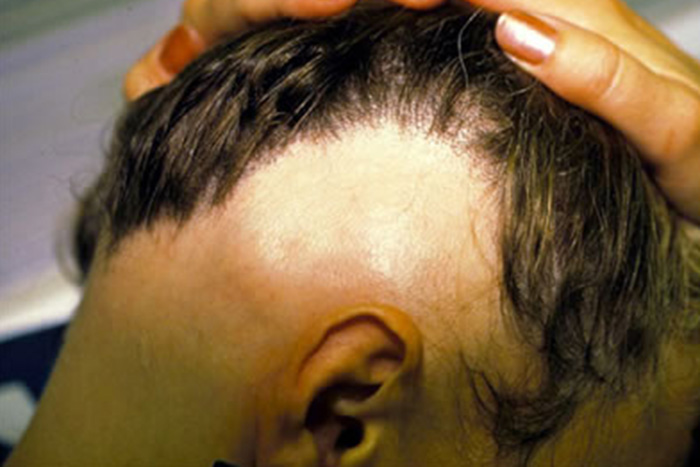Hair Loss in Women
About Hair Loss in Women
Hair loss in women can be very devastating, affecting a woman’s self-confidence in ways that can prevent her from living a confident and happy life. There are several causes of hair loss in women, and it is important to understand these when deciding on a treatment approach. A personal consultation will help in diagnosing hair loss and developing the best treatment options.

FPB – Female Pattern Baldness
Female pattern baldness usually begins about age 30, becomes noticeable around age 40, and may even be more noticeable after menopause. Female hair loss is usually an overall thinning — two hairs where five used to be–rather than a bald area on top of the head. It’s estimated that about 20 million American women experience hair loss, which similarly to male pattern baldness, is partly genetic and partly hormonal.
FPB can present itself in localized or diffuse patterns. In localized FPB, the hair loss may be limited to areas of the top of the head, from the forehead back to the crown. In Diffuse Hair Loss, the hair loss usually extends beyond the top of the head to the sides and or back. The diagram below shows the Ludwig Scale of hair loss in women. This scale classifies FPB on the top of the head.
Stress
Surgeries, severe illness, and emotional stress can also cause hair loss. The body simply shuts down production of hair during periods of stress in order to devote its energies toward repairing vital body structures. In many cases, there is a delay between the actual event and the onset of hair loss. Furthermore, there can be another long delay prior to the return of noticeable hair re-growth. This means that the total hair loss and re-growth cycle can last 6 months, or possibly longer when induced by physical or emotional stress. Usually, stress-induced hair loss may resolve itself once the stress has abated and the body returns to its normal function.

Alopecia Areata and Alopecia Totalis
Often inaccurately referred to as simply Alopecia, these types of hair loss are very different from FPB: these types of Alopecia are conditions of the immune system. Alopecia Areata presents itself as patches of hair loss. Usually, the hair loss is complete in the affected area and the skin appears as if there is no hair or follicle at all. However, in these cases, the hair is just dormant (telogen), not dead, and may grow back unexpectedly at any given time. Areata can present itself as small circles, patches, or large areas that can occur anywhere on the scalp. These patches usually come and go throughout the person’s life making treatment difficult, and often chronic. Some people have had favorable results with cortezone injections, and non-surgical alopecia areata hair systems.
Alopecia Totalis is similar to Areata in all ways except that it refers to the condition when it affects the entire scalp. Alopecia Universalis, in comparison, is the same condition when it affects the entire body.
Other Causes
There are several other conditions that can contribute to hair loss — these include anemia, or low blood count, and thyroid abnormalities. Both of these conditions can be detected by a simple blood test.
Women may experience some noticeable hair loss in the wake of a major hormonal change. In most cases, however, the condition does not become terribly advanced. Post pregnancy hormone conditions can be a cause of this type of hair loss, as can discontinuation of birth control pills, menopause, and menstrual cycles. In most cases, the condition is temporary. Many women discover that their hair will grow back to its former luster within a year.
Hair loss may also occur as a result of dieting. Franchised diet programs, which are designed or administered under the direction of a physician with prescribed meals, dietary supplements, and vitamin ingestion, have become very popular. Sometimes, the client is told that vitamins are a necessary part of the program to prevent hair loss associated with dieting. From a dermatologist’s standpoint, however, the vitamins cannot prevent hair loss associated with rapid, significant weight loss. Furthermore, many of these supplements are high in vitamin A, which can magnify hair loss.
Women can choose various treatment approaches. The best approach is determined in consultation with an experienced representative who can determine the causes, and suggest the most suitable approaches.
